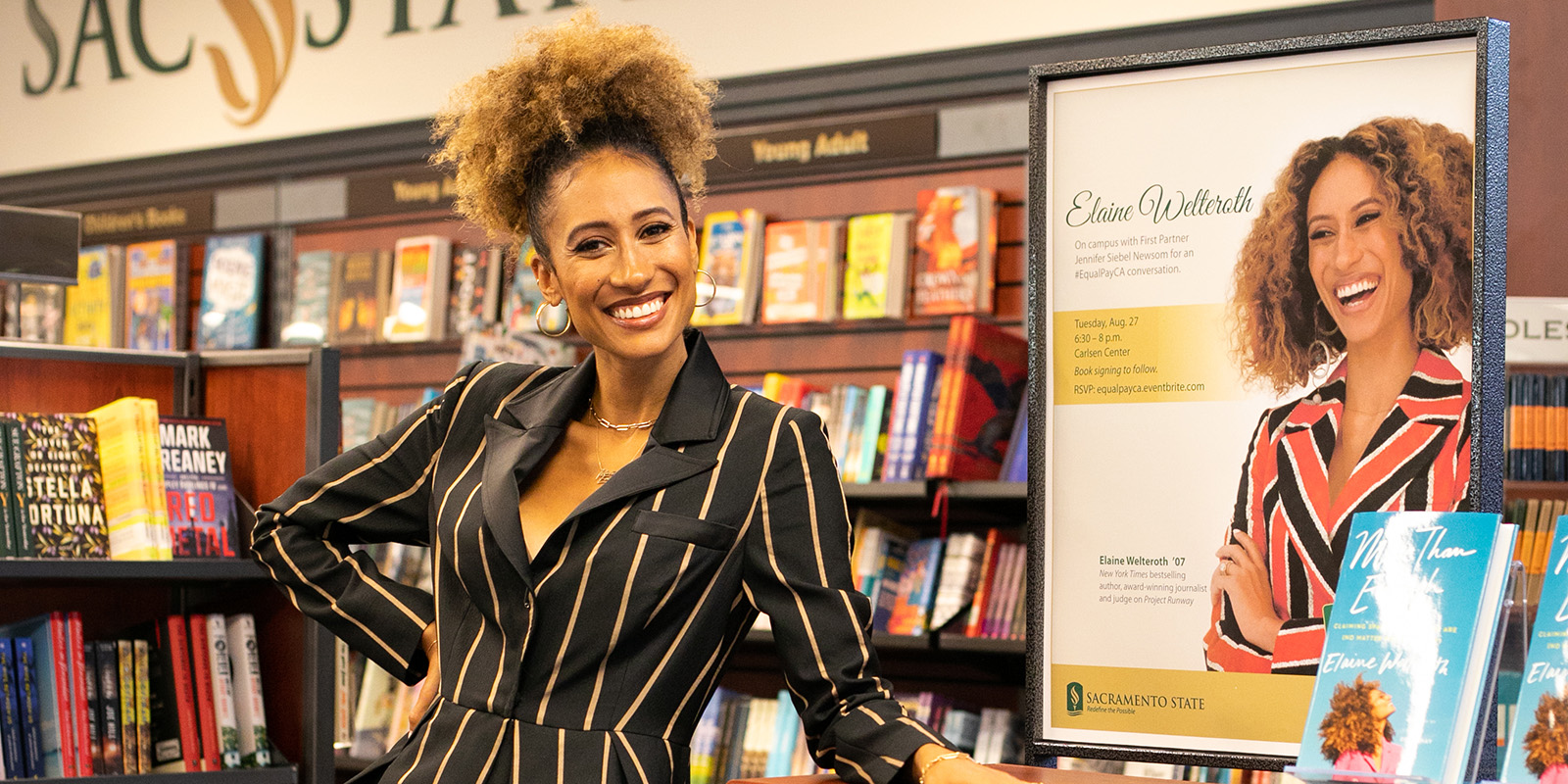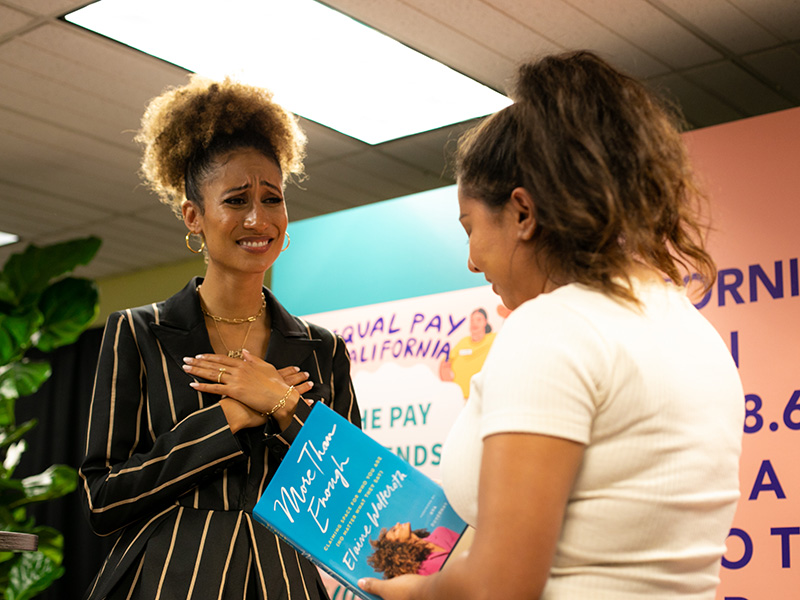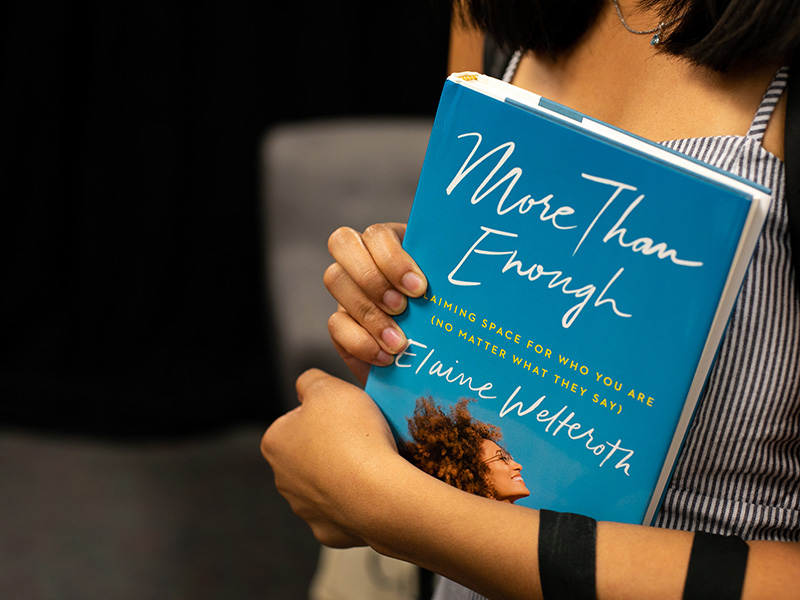Story Content
Vogue Voice
Elaine Welteroth’s flight to cultural heights started with Sac State launch

November 15, 2020
"What can we do about this A-minus situation?"
What does it mean to be ‘Made at’? It means the experiences our alumni had at Sac State gave them something valuable. And they are sharing that value out in the world, where their impact is being felt more and more.
Michele Foss-Snowden was used to student Elaine Welteroth visiting during office hours. But this question took her aback.
Girl, that's a great grade, Foss-Snowden thought. But Welteroth, aiming higher, made a compelling argument - and walked out of the professor's office with an A.
"I knew then she had what it took," Foss-Snowden says.

It was just another step in a remarkable professional advance for Welteroth, whose star has continued to rise since she graduated from Sacramento State in 2007 with a degree in Communication Studies.
A groundbreaking author and journalist, in 2016 she was named editor-in-chief of Teen Vogue, the youngest person and only the second African American individual to hold that title at a Conde Nast publication. In March, she debuted as a judge on the popular television reality show Project Runway, and she has spent much of the year promoting her bestselling book, More Than Enough.
Welteroth's Sac State education and experiences are credited with laying the foundation for much of the success that followed. And no one had a bigger impact than the professor Welteroth affectionately calls "M. Foss."
In More Than Enough, Welteroth doesn't mince words about enrolling at Sac State. She had her eyes set on Stanford and was eligible for scholarships. Instead, she said she followed her boyfriend to Sacramento, a decision that left her with "hot, chest-tightening pangs of regret" - though she's quick to point out it was less because of choosing Sac State and more because of the reason she chose it.
But the University became a place where she could more fully explore her biracial identity - her mother is black and her father is white - and find her voice. That became crystal-clear the first day of her sophomore year when she walked into Foss-Snowden's Introduction to Rhetorical Criticism class.
"I don't know who I was expecting to see at the head of that class, but it was definitely not M. Foss. She was a woman of color. She had curly hair like mine. She was stylish. She was relatively young, and cool," Welteroth says.
"I was just enthralled by her, because it was the first time that I saw myself in a young professional woman."
Foss-Snowden didn't conform to the either/or categories into which women are often forced. Like Welteroth, she was multiracial; fashionable and smart; cool and in command of her classroom. M. Foss became a mentor, a role model and, eventually, a close friend.
"She helped me learn how to see the world through a critical lens, and she helped me put language to some of the insights I was gathering as a young woman consuming film and lots of forms of media, and the messages I was internalizing," Welteroth says.
"I didn't realize at the time that you could make a career out of being a cultural critic, and she's equipped me with tools that have helped me become successful in analyzing the world we live in."
Foss-Snowden remembers Welteroth as a motivated and bright student who sat in the middle of class and always had her hand raised.
"She would challenge me with some of the comments she would make," Foss-Snowden says. "It takes a really special kind of student to be willing to stand up for what she's thinking and what she believes in."

Sacramento State also is where Welteroth cultivated her love for storytelling. A gifted writer from a young age, she made her first foray into journalism through the State Hornet student newspaper, writing a handful of feature stories in 2006. That same year, one of her journalism professors offered an automatic A and semester-long reprieve from attending class for any student who could get her or his byline in a national publication.
Welteroth successfully pitched a 200-word "blurb about footwear" to Figure magazine, then used the time gained from her release from class to continue writing for the publication.
"That was the beginning of my magazine career," she says. "I really got addicted to that creative process. Coming up with that idea, pitching it, and then seeing it through to execution. I don't know that I would've had that kind of discovery elsewhere."
After graduating a semester early, Welteroth moved to New York City to work at Ebony magazine, eventually becoming its beauty and style editor. In 2011, she took that same position at Glamour, and in 2012 it was on to Teen Vogue, where she was the first black woman named health and beauty director for Conde Nast. Four years later, she was promoted to editor-in-chief.
Welteroth says growing up biracial meant she rarely saw herself reflected in media or popular culture, including the magazines she loved reading as a child. She also was keenly aware of the pressures and responsibilities of being "FOD," an acronym coined by television producer Shonda Rhimes meaning "first, only, different." At Teen Vogue, she worked to build a more inclusive publication.
Her first story encouraged teens to embrace their natural hair. The August 2015 issue featured three black cover models as "fashion's new faces," bucking conventional wisdom that said only white or well-known faces sold magazines. Teen Vogue began talking about issues such as feminism, cultural appropriation, and politics.
The change in direction made headlines and surprised many, but Welteroth says it was merely a reflection of what she had learned about her audience: They were the most diverse and, she judged, politically aware generation since the 1960s. They also were more sophisticated than many presumed.
"They, of course, love and care about fashion and beauty and celebrity. Who doesn't? But they also see themselves as activists, as agents for change," she says. "We wanted to speak to them holistically about all of their interests."
Her rise through the magazine ranks wasn't without challenges. She was often the only woman of color at the decision-making table. Her promotion at Teen Vogue did not come with a commensurate increase in salary or benefits, and she was only given 30 minutes to accept, leaving her to wonder if a white man would have received similar treatment.
Despite Teen Vogue's success, Conde Nast discontinued the magazine's print edition in November 2017. Two months later, Welteroth made the difficult decision to leave.

But the time she had spent amplifying the voices of young people, especially young people of color, helped clarify her next step. In June, she published More Than Enough: Claiming Space for Who You Are (No Matter What They Say) - a manifesto, she says, not a memoir - to share with the next generation of leaders her journey and lessons she learned along the way.
Returning to Sacramento State in August to speak at an event promoting equal pay and gender equity in the workplace - her first return to campus since graduating - she elaborated on why she wrote More Than Enough.
"As human beings, the way we learn best is through storytelling," Welteroth told attendees. "We have work to do in terms of sharing tools, as women, and to help level the playing field.
"My lesson was, I have a responsibility to tell my story. I cannot be held up as a role model or as a trailblazer if I am not leaving that trail with some signposts along the way."
In that vein, she returned to the professor who helped initiate her journey from Sacramento State student to magazine superstar to a voice of her generation. Foss-Snowden was one of the first people in whom Welteroth confided her desire to be a magazine editor - and her uncertainty. Foss-Snowden responded with unequivocal support and affirmation.
"I would never have unlocked my courage to go after the dreams that were deeply embedded inside of me had I not had a woman like my M. Foss next to me," she told the audience as her mentor, listening in the audience, wiped away a tear.
"I'm feeling all the feels tonight. Full-circle moment for real."